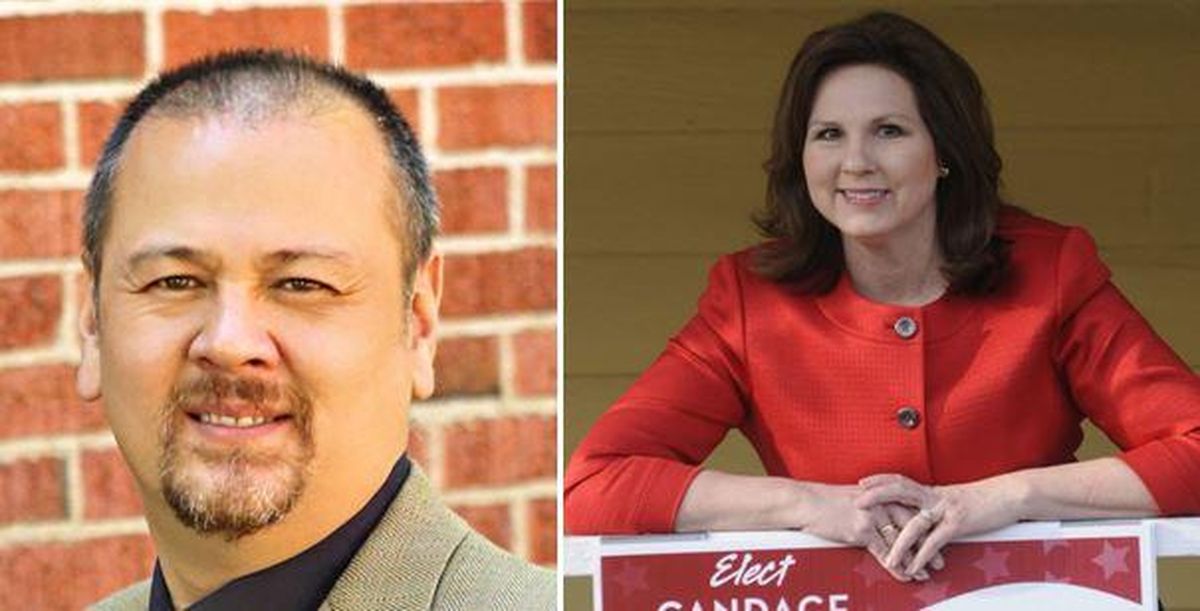Mumm, Howes take opposing sides in North Monroe debate in battle for Spokane City Council seat

This election season, the streets are political in northwest Spokane.
City Councilwoman Candace Mumm, 56, faces political newcomer Matthew Howes, 48, in the bid to retain the seat she won in 2013. Howes has allied himself with a group of business owners upset about planned lane reductions on North Monroe Street. Mumm says the lane changes will transform the neighborhood and make it safer for pedestrians.
The two positions on the road plan show the roots of each candidate. Mumm came to the council by way of the Five Mile Neighborhood Council, and touts her work on the city’s first crosswalk ordinance passed in 2014.
“I think I have a reputation of standing up for neighborhoods,” Mumm, a former television broadcaster and current real estate investor, said. “That’s what I’ve worked on. For me, it’s less about politics and more about people and where they live.”
Howes is co-owner of Adelo’s Pizza, Pasta and Pints, serving the North Indian Trail neighborhood with pub fare and craft beer for the past nine years. Taking a break from his duties behind the counter to talk politics, Howes, who was born in Vietnam and came to Spokane as a child escaping war in 1975, wears a shirt that urges voters to “Vote for the pizza guy, he’ll deliver.”
“This is my livelihood, and this is what I’ve built my career on,” Howes said. “I have the resources, and the steps I’ve already put into place, to be able to step away from it.”
Howes has railed against the lane reduction plan, which Mumm is quick to point out wasn’t directly approved by the Spokane City Council. Howes said going to a three-lane configuration on Monroe doesn’t make sense, given the anticipated population growth in the city.
“Do I think that there are safety issues, and that there are beautification issues? Absolutely, there’s no question about it,” Howes said. “The difference between her and I is that I don’t have all the answers, and I don’t pretend to have all the answers.”
Howes said at a forum held by The Spokesman-Review last week he’d be in favor of a plan proposed by City Councilman Mike Fagan to make the road a four-lane arterial, though city officials have warned that would put millions in grant funding for the project at risk. Howes said he also supported lighted crosswalks for the stretch, like those installed near Gonzaga University on Hamilton Street.
Mumm said her focus is on ensuring businesses have support in the form of financial assistance and marketing to endure the planned seven-month construction schedule. At The Spokesman-Review forum, the councilwoman said both pedestrian safety and economic vitality were behind her support for the project.
“Citizens and cities have a right to improve their streets. If the rest of the community, and the rest of the state, have concern that there would be a harm that could potentially happen, I don’t think a whole lot would be built,” Mumm said.
Mumm’s endorsement of the project this week has been more enthusiastic than her prior statements on the subject. After Fagan introduced his resolution earlier this month, Mumm said her focus was on providing financial support for businesses during construction.
“At this point, it’s not a matter of do I or don’t I,” Mumm said of her position on the lane reduction Oct. 9. “It is what it is. It’s going forward.”
Mumm said she’d focus on work at the state level to establish permanent supervision for felons convicted of car theft and continue to spur reinvestment in what she called “zombie properties,” houses and lots that remain vacant for long periods of time to the detriment of neighborhoods.
Terry Deno, chairman of the North Indian Trail neighborhood, praised Mumm’s attention to the issues, particularly her work assisting residents working against a 750-unit apartment complex they believed would unduly stress roads in the area.
“She’s been a terrific asset to our neighborhood,” Deno said. “She attends all our meetings. If we have any problems that arise, and we need her help, she’s been there for us.”
Deno gave $50 to Mumm’s campaign, which also has pulled in major contributions from City Council President Ben Stuckart, his congressional campaign, Avista Corp., the Spokane County Democrats and the Spokane Tribe of Indians. In total, Mumm has raised about $50,500.
Howes said he’ll work to bring differing opinions to the City Council, which he accused of engaging in “one-sided decision-making.”
“I think that we’re in a point now where people are getting very frustrated,” Howes said.
Katy Azar, owner of Azar’s Restaurant on Monroe Street, said she’s supporting Howes in the race because she believes he’ll bring forward policies that support businesses like hers.
“He understands the struggles, and the cost of running a small business,” Azar said.
Azar opposes the Monroe Street project. The restaurant has given $300 to Howes’ campaign, whose top donors include the Spokane Home Builders Association, DeLeon’s Foods, the Inland Pacific Chapter of the Associated Builders and Contractors and the Washington Association of Realtors. He has raised a total of about $19,500.
The Spokane County Republican Party has also endorsed Howes in his run against Mumm.